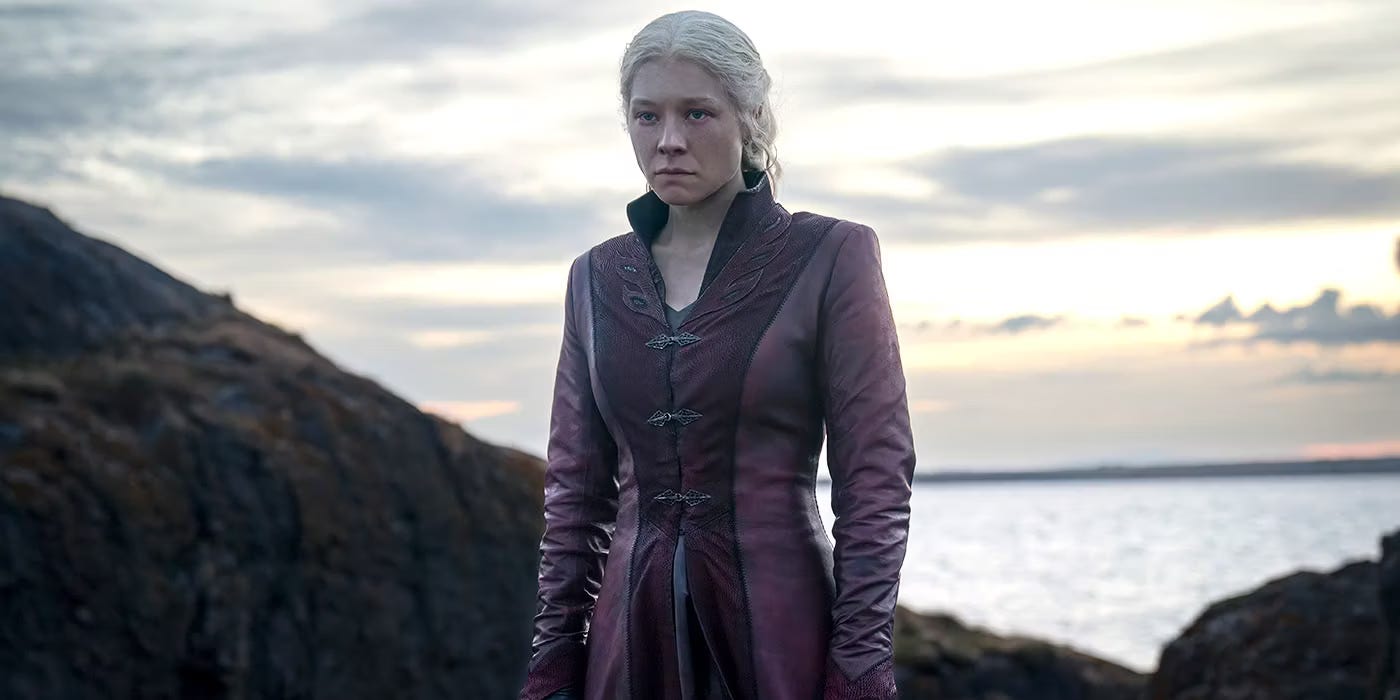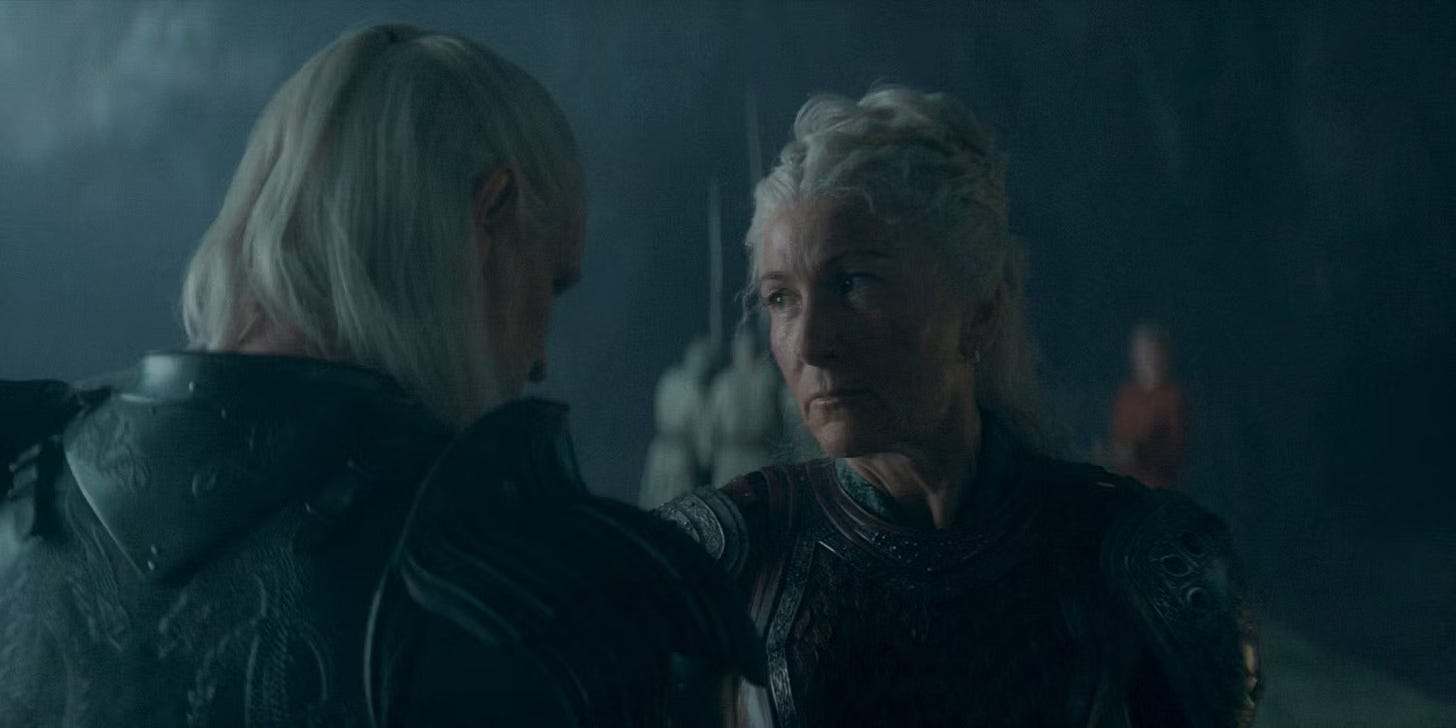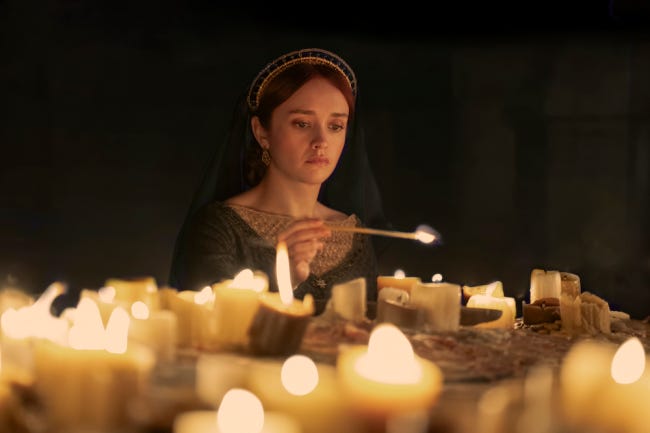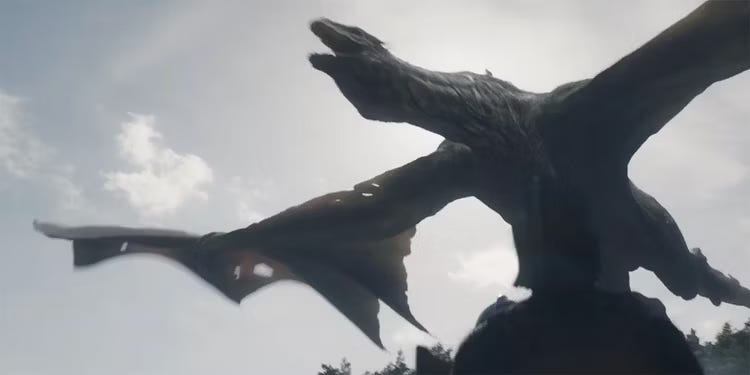The HotD S2 premiere throws us right back in the fire.
It feels great to be back in this world, even as the story trends more and more tragic.
The Short Take:
This season premiere throws us right back into all the drama and intrigue set up by the first season. I hope you like watching these characters make a series of bad decisions! Because I think we’re just getting started.
Dragon Count:
3
(I’m starting over from last season so this count may include dragons we’ve already seen in Season 1.)
[SPOILER WARNING: If you haven’t yet seen the Season 2 premiere, then rest and gorge on it before you continue reading.]
Image Credit: Collider
The Long Take:
Good help is so hard to find, am I right?
Just as I was about to say that this episode was a great way to toss me back into the fray and reacquaint me with where we are in the story, and just as I was about to declare this entirely a “table setting” episode in which conversations portend conflict rather than directly engage with it, they go and kill a child in the last ten minutes. Shame on me for not bracing myself for such a classic Westerosi act of brutality. Pedicide is no stranger to the Seven Kingdoms, of course. But this instance, well-placed at the end of a season premiere, feels like the show wants to remind us, “Hey, you watch this show because we dare to go there. Never forget it.”
And how can I? The sound of the rat catcher repeatedly sawing young Jaehaerys’ neck off-screen, with all the precision and care of a bull in a china shop (or maybe just a rat catcher in a royal bed chamber?), will occupy space in my memory for some time. A bunch of Internet folk have expressed disappointment that this murder took place off screen or that the exchange between Blood, Cheese, and Helaena was not as harrowing as in George R. R. Martin’s book, Fire and Blood, but the scene we got here was nauseating enough for me, thank you.
Image Credit: The Hollywood Reporter
More than just a “cover your face with your hands/oh, they really did that” shocker, this scene is confirmation that the gulf between Rhaenyra and Alicent can only widen from here. We still, after so many episodes in which they appear to be sworn enemies, hear from characters about how the bond between them has made them soft. The show is trying to tell us that at least Alicent still cares about Rhaenyra, as she lights a candle in the Sept for Luc. Rhaenys last season also famously said that while all the men in the room urge her to plunge the realm into war, she is the only one holding it together. Neither of these women, it seems, actually want to hurt each other. Neither of them actually want war.
And yet, they are being pulled apart and dragged across a battle line by all those around them. I do think that Daemon paying for Aemond’s murder but getting a child’s murder now acts as a mirror image to Luc’s tragic loss in the Season 1 finale, in which Aemond may have thought he was just going to give Luc a good scare (though, as discussed in my review at the time, that’s very unclear). The title of this week’s episode, “A son for a son,” very literally points to the double pedicide, but, more than anything, the dual deaths are a sign that we have gone past the point of no return towards war, but not because of a direct act from either Alicent or Rhaenyra. They both, to varying degrees, cannot control the men around them and feel like they have to do damage control and clean up their messes. This is not to say that they are innocent — far from it. Only that in trying to do their best as leaders and parents they inevitably rely on those who would do things…differently.
Yes, Rhaenyra does say, “I want Aemond Targaryen.” In fact, it’s the only line she has in the entire episode. But because, as queen, she cannot actually walk up to Aemond and murder him herself, she has to entrust someone like Daemon to don his shifty cloak once more. And while I very much acknowledge that she asked for Aemond’s head in that war room meeting, she unequivocally did not say, “oh, and if he’s not available, then any Hightower Targaryen head will do.” Rhaeynyra didn’t say a son for a son. Daemon did. She only named Aemond. Daemon is the one who either didn’t give very clear directions or got a little creative with his interpretation of Rhaenyra’s request.
Image Credit: Screen Rant
Regardless, all hope of reconciliation is gone. While there may have been a fleeting moment or two last season in which I thought that these crazy kids could have worked it out, this episode shows us in no uncertain terms that all out war is the only place we go from here. The murder of a six-year-old child, never mind one you are related to, cannot be taken back or smoothed over. I get the sense that the show wants us to think there was a sliver of a chance of backing down after Luc’s death, but even that sliver has died with Jahaerys. Now all that remains is the gut punch of tragic irony, because we saw Alicent light a candle, but Rhaenyra did not. And now we know that they will both act based on the actions of their son or husband rather than their understanding of the other woman’s feelings.
Image Credit: IndieWire
The phrase “a son for a son” echoes the more common idiom, “an eye for an eye,” which is, arguably, what actually started all this. Right before Vhagar chomps into Arrax and Luc, Aemond demands Luc’s eye as payback for his own all those years ago. And when Rhaenyra and Alicent have that crazy fight in front of everyone in Season 1 Episode 7, it’s because she demands an eye for eye too.
So what does it mean that we’re going from an eye for an eye to a son for a son? The most obvious answer is escalation. I think the escalation from a body part to a whole person, and, more specifically, a whole child, is where we’ve been headed all along. Otto Hightower, after all, warns a young Alicent that if there is any disagreement about the line of succession, Rhaenyra would be forced to execute Alicent’s children to shore up her claim to the throne: "If Rhaenyra succeeds [Viserys], war will follow, do you understand? The realm will not accept her, and to secure her claim, she'll have to put your children to the sword. She'll have no choice. You know it! You're no fool, and yet you choose not to see it. The time is coming, Alicent. Either you prepare Aegon to rule, or you cleave to Rhaenyra and pray for her mercy!” Alicent then goes on to echo a similar hard truth rant at Aegon, highlighting that his life is at risk because his existence challenges Rhaenyra’s claim to the throne. I would guess that in future episodes, Alicent interprets young Jahaerys’ death as confirmation that her father was right all along.
Every once in a while I remember that George R.R. Martin was originally inspired by actual British history — in particular, the War of the Roses, which were a series of civil wars between rival houses with competing claims to the throne. One story that those who visit The Tower of London may learn is especially pertinent to this week’s episode, and provides a historical precedent through which to understand Jahaerys’ murder. One of English history’s saddest mysteries is what become of the two “princes in the tower.” Prince Edward V, age 12, and his younger brother Richard, age 9, were the only living heirs of King Edward IV upon his death in 1483. They were living in the Tower of London, supposed for their own protection, and mysteriously disappeared.
The prevailing theory, though it has never been definitively proven, is that their uncle, Richard, Duke of Gloucester, had them killed so he could claim the throne. According to information provided by Historic Royal Palaces, the non-profit that takes care of England’s palaces, an unfinished biography of Richard III contained the first account of the princes, 30 years after the fact; “In this account, Richard is portrayed as the villain, blamed for ordering the boys' murders, to be carried out by two servants.” Much later, in 1674, the demolition of “a turret that had once contained a privy staircase leading into St John’s Chapel” revealed a “wooden chest containing two skeletons. It was concluded that they were the bones of children.” Again, forensic investigation has yet to conclusively prove that these bones belonged to young Edward and Richard, but the idea of them being quietly murdered in their beds while they were sleeping chillingly evokes what happens in this episode of House of the Dragon.
Image Credit: Wikipedia
The biggest difference between fiction and history, in this instance, is that I don’t think the murder of Jaehaerys will be much of a mystery. Alicent is going to bring all the might and fury she can muster down on Dragonstone. No child, on either side, is safe now. And, with all the pains this episodes goes to in order to establish the strategy of battle, whether that’s posting up in Harrenhal or blocking trade routes to King’s Landing, it’s clear that not only are all our characters poised for war. The war has already begun.
Image Credit: LA Times
Dragon Watch
When I said there were three dragons in this episode, I was referring to Meleys, Syrax, and Vhagar. I could have said four, though, if we count Arrax’s little blue wing that washes up on the beach. For me, the dragons are at their best when they’re helping to tell the story, and seeing a dismembered wing tangled in Lucerys’ cloak rather than Lucerys’ body seems like a restrained and perhaps therefore even more powerful way to help make his death more concrete for Rhaenyra because it recalls the circumstances of his death, fleeing Aemond and Vhagar in a panic with his trusty dragon. Seeing Syrax mourn alongside Rhaenyra also reinforces this idea that a dragon is simultaneously a companion and a sort of metonym for their rider.
Meanwhile, Meleys been working hard with Rhaenys to hold the naval blockade for Team Black. I thought the term “rest and gorge” was hilarious and want to steal that for myself. But, more importantly, we’re seeing the limitations of dragons as weapons with which to wage a war. They, for one, need enough food and rest to keep fighting. In an earlier scene, we see what economic ripple effect this might have on Westeros, as the farmers are having to give up a percentage of their sheep so they can become dragon kibble.
Image Credit: Collider
And Vhagar continues to dominate the dragon pecking order. She clearly has Swiss-cheese wings at this point, and yet that doesn’t seem to slow her down or make her any less intimidating. Daemon doesn’t even want to take Caraxes to face her without a buddy. That leaves me curious as to what will ultimately tip the balance of dragon power back to Team Black?










